Faculty members named to new professorships
By Jessamine Chan, John Easton, William Harms, Steve Koppes, Seth Sanders, Peter SchulerGraduate School of Business, Medical Center Public Affairs, News Office
Eight University faculty members, Bill Brown, Susan Gal, James Madara, Salikoko Mufwene, Anne Robertson, Thomas Rosenbaum, William Sewell and Nancy Stokey, have recently received distinguished service professorships.
Eight University professors have received named professorships, including two new faculty members, Frances Ferguson and Bruce Meyer.
Current faculty members who have received named professorships are: John Cochrane, Christopher Hsee, Vinay Kumar, Tanya Luhrmann, Françoise Meltzer and Simon Swordy.
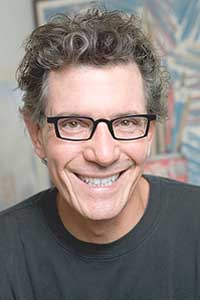 Bill Brown | |
Brown, whose Chicago colleague John Goldsmith carries the first Edward Carson Waller Distinguished Service professorship, has focused his research on the relationship between literature and everyday life in America. He has explored this relationship through material culture, addressing the issues of collective memory, race, gender and entertainment in his work.
Brown has recently published A Sense of Things: The Object Matter of American Literature, and is the author of The Material Unconscious: American Amusement, Stephen Crane, and the Economies of Play. He has edited the award-winning special issue, titled Things, of the University’s journal Critical Inquiry and Reading the West: An Anthology of Dime Novels, a collection that makes available some of the earliest “Westerns” from the 19th century.
Brown also has produced articles analyzing popular sports and entertainment forms, and has written on science fiction, toys and posters, as well as Virginia Woolf, Henry James and Charles Johnson.
He has received fellowships from the Chicago Humanities Institute, the Stanford Humanities Institute and the University of Utah. He is co-editor of Critical Inquiry and has served on the editorial board of American Literature. He served as Master of the Humanities Collegiate Division from 1998 to 2002.
Brown is a member of the Modern Language Association, the American Studies Association, the American Anthropological Association, the Stephen Crane Society and the Society for Cinema Studies.
He received his B.A. from Duke University and earned an M.A. in creative writing and a Ph.D. in modern thought and literature, both from Stanford University.
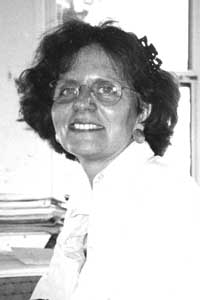 Susan Gal | |
In her research, Gal explores the role of language in shaping political, economic and gender relations. Her early research resulted in the book Language Shift: Social Determinants of Linguistic Change in Bilingual Austria, which describes the linguistic practices of a minority population in Eastern Europe, the making of ethnicity in the post-World War II period, and the process by which a bilingual community becomes monolingual. The book has been excerpted and quoted extensively.
Her subsequent research has taken up comparative questions, focusing on ethnic minorities throughout Europe, and on women’s linguistic resources and strategies worldwide.
She received a Guggenheim fellowship in 2002 to conduct research that challenges many of the widely held views about political language that scholars developed after the fall of communism in Eastern Europe.
The Politics of Gender After Socialism, co-written with Gail Kligman, offers a novel approach to the Eastern European transitions. Gal also has co-edited two volumes on language and authority and on reproduction. In her forthcoming analysis of communist and post-communist political talk, her goal is to develop a more general approach to language and political authority that will encompass politics in various social systems.
Gal received a B.A. in anthropology and psychology in 1970 from Barnard College and a Ph.D. in anthropology in 1976 from the University of California, Berkeley. She joined the Chicago faculty in 1994 after serving on the faculty at Rutgers University.
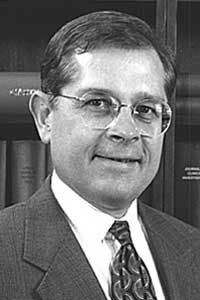 James Madara | |
As a scientist, Madara has made important contributions to understanding the biology of the cells that line the digestive tract. He has elucidated, at the molecular level, how these cells permit the absorption of nutrients while serving as a barrier to intestinal bacteria, and how these cells help regulate the innate immune response to normal and disease-causing bacteria. This research has been crucial to understanding infectious diseases that affect the intestines, to treating inflammatory disorders such as ulcerative colitis or Crohn’s disease, and to improving drug delivery.
In recognition of his research, Madara received the 1990 Warner-Lambert/Parke-Davis Award from the American Association of Pathologists and the 1991 Physician Scientist Award from the American Gastroenterological Association.
In 1997, he was elected to the Association of American Physicians and received a prestigious MERIT Award from the National Institutes of Health, and in 2002 he received the Astra Zeneca International Prize for Distinguished Research in Digestive Diseases. He has served on the editorial boards of several scientific journals and also served as editor-in-chief of the American Journal of Pathology.
Madara graduated from Hahnemann Medical College in Philadelphia in 1975, completed residency and research training in pathology at Harvard Medical School’s New England Deaconess and Peter Bent Brigham Hospitals, and joined the faculty at Brigham and Women’s Hospital in 1980, serving as director of the division of gastrointestinal pathology. In 1993, he was appointed professor of pathology at Harvard Medical School, and from 1994 until 1997, when he left Harvard for Emory University, he served as director of the Harvard Digestive Diseases Center.
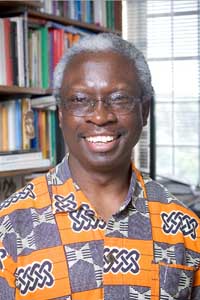 Salikoko Mufwene | |
Mufwene studies the development of Creole languages using an ecological approach inspired by population genetics. Over the past few years, he has used insights from his research on creoles to address issues on language evolution, including those of language endangerment. He also has investigated morphosyntactic and semantic characteristics of Gullah, African-American Vernacular English, Jamaican Creole and English. His earlier work dealt with kinship semantics, comparing English and Bantu languages.
He is the author of The Ecology of Language Evolution and the editor or co-editor of African-American English, Africanisms in Afro-American Language Varieties and Topics in African Linguistics, among many other works.
He has taught at the University of the West Indies and the University of Georgia, and he joined the Chicago faculty in 1991.
Mufwene has served as Chair of the Department of Linguistics, a visiting scientist at the Max Planck Institute for Evolutionary Anthropology in Leipzig, a visiting professor at Harvard University, and on the editorial or advisory boards of such journals as Langages, Journal of Pidgin and Creole Languages, Etudes CrŽoles, American Speech, Language Variation and Change, and World Englishes.
He also has received a Fulbright fellowship and grants from the National Endowment for the Humanities and the National Science Foundation, among many others.
Mufwene earned his Candidature en Philosophie et Lettres, Groupe Philologie Anglaise in 1970 from Lovanium University, Kinshasa/Zaire; his Licence en Philosophie et Lettres (equivalent to a B.A.), Groupe Philologie Anglaise, from the National University of Zaire with Highest Honors in 1973, and a Ph.D. in Linguistics in 1979 from Chicago.
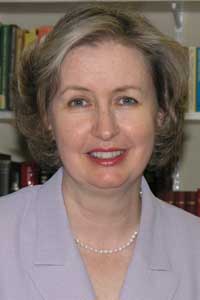 Anne Robertson | |
Her books include The Service Books of the Royal Abbey of St. Denis: Images of Ritual and Music in the Middle Ages, which earned the John Nicholas Brown Prize of the Medieval Academy of America; and Guillaume de Machaut and Reims: Context and Meaning in his Musical Works, which won the Otto Kinkeldey Award of the American Musicological Society.
Her honors include the Alfred Einstein Award of the American Musicological Society and the Van Courtlandt Elliott Prize of the Medieval Academy.
Robertson earned her B.Mus. in 1974 from the University of Houston, where she graduated Valedictorian; an M.Mus. in chamber music and accompanying in 1976 from the University of Houston; an M.Mus. in music theory in 1979 from Rice University; and the M.Phil. and Ph.D. from Yale University, in 1981 and 1984, respectively.
Robertson, who has taught at Chicago since 1984, has served as Deputy Provost for Research and Education and Chair of the Department of Music.
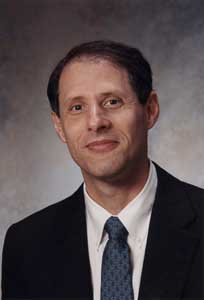 Thomas Rosenbaum | |
In a recent project, Rosenbaum and his associates showed how quantum mechanics, which dominates the microscopic world, under certain conditions also can manifest itself on the macroscopic scale. The demonstration is one in a long series of steps toward quantum computers, which would be faster and more powerful than today’s digital computers.
Rosenbaum conducted research at Bell Laboratories and IBM Watson Research Center before joining the physics faculty at Chicago in 1983. The former James Franck Professor in Physics, the James Franck Institute and the College, Rosenbaum is a former director of the University’s Materials Research Science and Engineering Center and the James Franck Institute. Since 2002, Rosenbaum also has served as Vice President for Research and for Argonne National Laboratory.
His honors include an Alfred P. Sloan Research fellowship, a Presidential Young Investigator Award and the William L. McMillan Award for Outstanding Contributions to Condensed Matter Physics. He also has delivered the Bertman Memorial Lecture at Wesleyan University.
Rosenbaum received his A.B. with honors in physics from Harvard University and his M.A. and Ph.D. in physics from Princeton University.
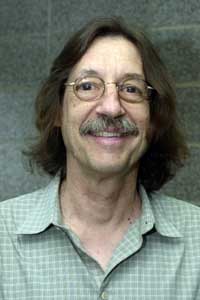 William Sewell | |
Sewell, who studies 18th- and 19th-century French history, is the author of Work and Revolution in France: The Language of Labor From the Old Regime to 1848, which has been translated into French, Italian and Spanish.
He also has written Structure and Mobility: The Men and Women of Marseille and A Rhetoric of Bourgeois Revolution: The Abbe Sieyes and What Is the Third Estate? Next year, the University Press will publish his latest work, Logics of History: Social Theory and Social Transformation.
Sewell was a University faculty member in History from 1968 to 1975 and rejoined the Chicago faculty in 1990 as Professor in Political Science and History. He spent the intervening years at the Institute for Advanced Study, the University of Arizona and the University of Michigan.
He has received numerous awards, including the Herbert Baxter Adams Prize from the American Historical Society in 1981 for Work and Revolution in France. The American Sociological Association has honored him with the Prize for Best Article in Comparative Historical Sociology in 1991; the Prize for Best Article in Cultural Sociology in 1993; and the Prize for the Best Article in Sociological Theory in 1993.
Earlier this year, Sewell was elected a fellow of the American Academy of Arts and Sciences.
He received his B.A. in 1962 from the University of Wisconsin and his Ph.D. in 1971 from the University of California, Berkeley.
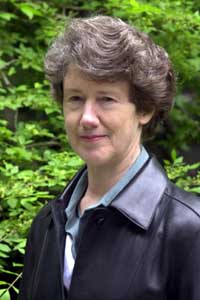 Nancy Stokey | |
She is the author of numerous papers on economic growth as well as co-author of Recursive Methods in Economic Dynamics, a book about economists’ research methods.
Stokey was among 72 new members elected to the National Academy of Sciences earlier this year in recognition of distinguished and continuing achievements in original research.
She also was selected to be part of the Copenhagen Consensus, a meeting in Copenhagen where some of the world’s leading economists gathered in May to rank the biggest challenges of the world. The roundtable was co-sponsored by The Economist and the Danish National Environmental Assessment Institute.
Stokey, an editor of the Journal of Political Economy, also has served as co-editor of Econometrica, associate editor of Games and Economic Behavior, and associate editor of the Journal of Economic Theory. She was vice president of the American Economic Association from 1996 to 1997.
Stokey has looked at the causes and consequences of economic growth in her work. In a paper titled “R&D and Economic Growth,” she examined the incentives for firms to invest too much or too little in developing new products or technologies. In a paper titled “Are There Limits to Growth?” she looked at the demand in richer societies for legislation to curb pollution, and compared the efficiency of taxes, vouchers and other mechanisms in reducing pollution while maintaining incentives for capital accumulation.
She joined the University faculty in 1990 after serving on the faculty at Northwestern University, where she was the Harold Stuart professor of managerial sciences. She received a B.A. in economics from Pennsylvania State University in 1972 and a Ph.D. in economics from Harvard University in 1978.
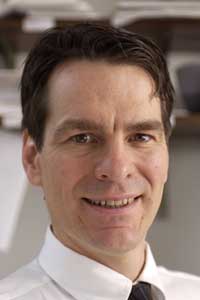 John Cochrane | |
Cochrane’s research focuses on finance, macroeconomics and monetary economics. He is the author of Asset Pricing, for which he was awarded the 2001 TIAA-CREF Institute Paul A. Samuelson Award. Cochrane first received the Samuelson Award in 1999 as a Certificate of Excellence for “By Force of Habit.”
His many academic publications include “Bond Risk Premia” with Monika Piazzesi, forthcoming in the American Economic Review; “The Risk and Return of Venture Capital,” forthcoming in the Journal of Financial Economics; and “Stock as Money: Convenience Yield and the Tech-Stock Bubble” in Asset Price Bubbles.
Cochrane is currently director of the Asset Pricing Program at the National Bureau of Economic Research, at which he has been a research associate since 1998.
From 1998 to 2003, Cochrane was an editor of the Journal of Political Economy. He also has served as associate editor of the Journal of Business, the Journal of Monetary Economics, the Journal of Economic Dynamics and Control, and the Journal of Money Credit and Banking.
Prior to joining the GSB faculty in 1994, Cochrane taught in the Department of Economics for 10 years. He also has served as a visiting professor of finance at the University of California, Los Angeles’ Anderson Graduate School of Management from 2000 to 2001.
Cochrane earned an S.B. in physics from the Massachusetts Institute of Technology in 1979, and a Ph.D. in economics from the University of California, Berkeley in 1986.
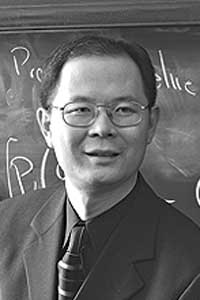 Christopher Hsee | |
Hsee’s research focuses on judgment and choice, the interplay between psychology and economics, subjective well-being and happiness, emotion, consumer behavior, and cross-cultural psychology.
Hsee’s work has been published in numerous academic journals, including “Distinction Bias: Misprediction and Mischoice Due to Joint Evaluation” with J. Zhang, published in the Journal of Personality and Social Psychology; “Music, Pandas, and Muggers: On the Affective Psychology of Value” with GSB Visiting Associate Professor of Behavioral Science Yuval Rottenstreich, published in the Journal of Experimental Psychology; and “Why Are People so Prone to Steal Intellectual Property? The Effect of Cost Structure on Purchase Intentions” with Elke Weber, published in the Journal of Public Policy and Marketing.
Hsee is Co-director of the Executive Program in Negotiation and Decision-making Strategies for Managers at the GSB. He has visited China Europe International Business School in China and was a founding member of the International Association of Chinese Management Research.
Hsee has served on the editorial boards of such journals as Journal of Marketing Research, Journal of Behavioral Decision Making, and Organizational Behavior and Human Decision Processes. He also has served as a reviewer for many other journals, such as the American Economic Review, the Journal of Consumer Research, the Journal of Experimental Psychology, Psychological Bulletin, and the Journal of Marketing Research.
Hsee earned a B.A. in psychology from the University of Hawaii in 1989, and a Ph.D. in psychology from Yale University in 1993.
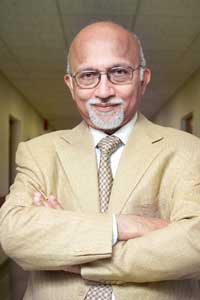 Vinay Kumar | |
He was recently elected a fellow of the American Association for Advancement of Science. He also is an author of Pathologic Basis of Disease and Basic Pathology, one of the best-selling texts in the field.
He came to the United States in 1972 to join what was, at the time, a most renowned pathology faculty at Boston City Hospital and Boston University, where he was honored for his teaching and research skills in both the basic and clinical sciences. He continued to be honored as a teacher and scientist after joining the faculty at the University of Texas Southwestern in 1982, where he became a professor of pathology in 1983.
The author or co-author of five pathology textbooks and teaching aids, Kumar has published more than 150 original articles in scientific journals, a dozen book chapters and nearly 20 review articles. He has lectured throughout the United States and Europe, served on the editorial boards of several journals, including the Journal of Immunology, and recently completed his term as president of the American Society of Investigative Pathology.
Born in India in 1944, Kumar graduated with honors, at the age of 17, from Poona University. He earned his M.B.B.S., (the equivalent of the M.D. degree) in 1967, at the age of 22, from Punjab University Medical College, where he was named “Best Medical Graduate,” winning the Pfizer Award and the Gold Medal for highest achievement as a medical student.
He completed both his M.D. (Ph.D. equivalent) in experimental pathology and his residency in anatomic pathology and hematology in 1972, at the All India Institute of Medical Sciences, where he was awarded the Khanolkar Prize for outstanding research in pathology.
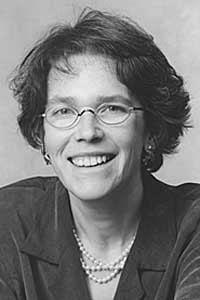 Tanya Luhrmann | |
Luhrmann, an anthropologist who uses ethnographic methods to focus on traditionally psychological topics, has published Persuasions of the Witch’s Craft: Ritual Magic in Modern Culture; The Good Parsi: The Postcolonial Anxieties of an Indian Colonial Elite; and Of Two Minds: An Anthropologist Looks at American Psychiatry.
A cultural anthropologist, Luhrmann studies the connections between mental health, religion and culture, focusing her ethnographic research on psychiatric and religious experience. Her specific research interests include witchcraft, South Asia, modern American religions, trauma and people with serious mental illness.
She has received numerous awards for her work, including the Stirling Prize from the American Anthropological Association for an essay on psychological anthropology titled “The Magic of Secrecy.” Luhrmann also received the Victor Turner Prize for Ethnographic Writing for her book Of Two Minds: An Anthropologist Looks at American Psychiatry. This title refers to a tension at the heart of American psychiatry, that is, the co-existence of two very different ways of thinking about and treating mental illness: bioscience and pharmacotherapy, and psychodynamics and psychotherapy.
Her work shows that both approaches have validity in helping people overcome mental illness. She was inducted into the American Academy of Arts and Sciences in 2003.
In researching the topic, she conducted more than four years of ethnographic study as a participant-observer in psychiatric training programs, hospital wards, residential treatment programs, individual and group therapy sessions, and various professional conferences.
Luhrmann received a B.A. from Harvard University in 1981, and a Ph.D. in social anthropology from Cambridge in 1986. She joined the Chicago faculty in 2000, after serving as a professor at the University of California, San Diego.
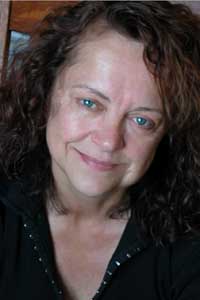 Françoise Meltzer | |
Her book Hot Property: The Stakes and Claims of Literary Originality examines the ideas of originality and authorship in a series of case studies from Descartes to Walter Benjamin. Her most recent book, For Fear of the Fire: Joan of Arc and the Limits of Subjectivity, explores the gendering of subjectivity from within the context of Joan of Arc’s trial.
Currently, Meltzer is working on a book that examines the notion of rupture (in history, philosophy, architecture and literature) as read in the events that surround the year 1848 in France.
She recently co-edited with colleague David Tracy, the Andrew Thomas Greeley & Grace McNichols Greeley Distinguished Service Professor in the Divinity School, a “Symposium on ‘God’” for the journal Critical Inquiry. Presently, she is co-editing, also with Tracy, a book on religion and postmodernist texts.
A co-editor of Critical Inquiry since 1982, Meltzer joined the Chicago faculty in 1975. She also served as a visiting professor at the University of California, Berkeley, and at Cornell University. At Chicago, she served as Chair of the Department of Comparative Literature for seven years, and she completed a term as a fellow of the Franke Institute for the Humanities in 2003.
Meltzer earned her B.A from Ohio University in 1969, studied at the University of Freiburg in Breisgau from 1967 to 1969, and earned her M.A. and Ph.D. in Comparative Literature from the University of California, Berkeley, in 1971 and 1975, respectively.
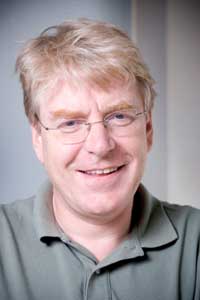 Simon Swordy | |
As a member of the VERITAS (Very Energetic Radiation Imaging Telescope Array System) collaboration, Swordy is looking for evidence of gamma-ray emissions from the remnants of exploding stars. Such evidence could help identify the mysterious source of high-energy cosmic rays, which are subatomic scraps of matter that bombard Earth from all directions.
Swordy began his career as a research assistant in cosmic-ray physics at the University of Bristol in the United Kingdom in 1978. The following year he became a Research Associate at the Enrico Fermi Institute.
He attained the rank of Professor in Physics in 2000. From 2000 to 2003 he served as Master of the Physical Sciences Collegiate Division and Associate Dean of the Physical Sciences, and as the George E. Uhlenbeck visiting professor of physics at the University of Michigan. He also is an elected fellow of the American Physical Society.
Swordy received his B.S. degree with first-class honors and his Ph.D. from the University of Bristol.
![[Chronicle]](/images/sidebar_header_oct06.gif)